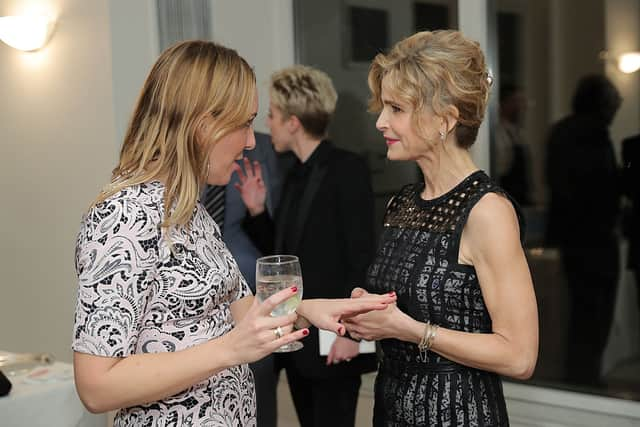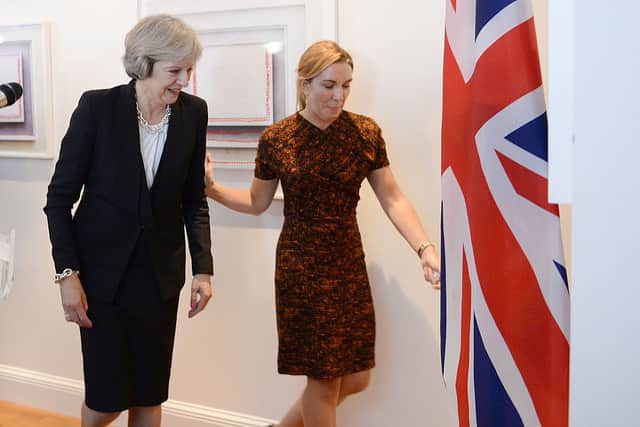Who is Antonia Romeo? Outside candidate lined up by Kwasi Kwarteng to be top Treasury civil servant
and live on Freeview channel 276
Chancellor Kwasi Kwarteng is set to appoint an outside candidate to replace Sir Tom Scholar as the Treasury’s chief civil servant.
Government sources told the Financial Times that Ministry of Justice Secretary Antonia Romeo had emerged as Mr Kwarteng’s “clear preference” for the role. If appointed, she would be the first woman to hold the position.
Advertisement
Hide AdAdvertisement
Hide AdChoosing Ms Romeo for the job would mark a clear break from tradition, as all of her competitors have previously worked in the Treasury. The final decision will be made by Prime Minister Liz Truss and cabinet secretary Simon Case, not by the Chancellor, but Ms Truss’ denouncement of the Treasury’s “orthodoxy” during the Tory leadership race is an indicator to some that she is likely to opt for an outside candidate.
Whoever is ultimately picked for the role will replace Mr Scholar, a popular and experienced civil servant who to many embodied a traditional Treasury mindset on ‘sound money’. Mr Kwarteng fired him on his first day as Chancellor, saying the department needed “fresh leadership” - a move which some experts argued contributed to the financial markets’ recent unease about the new Government’s economic direction.
But outside of those discussions, the key question that remains is who exactly is Antonia Romeo? Here’s everything you need to know about the favourite candidate for the Treasury’s new chief civil servant.


Who is Antonia Romeo?
Antonia Romeo, 48, is a British civil servant.
She was born in London and went to school at North London Collegiate School and then Westminster School, before going on to study philosophy, politics and economics at the University of Oxford. Following a break from education, she earned a master’s in economics from the London School of Economics.
Advertisement
Hide AdAdvertisement
Hide AdCurrently, Ms Romeo is serving both as the permanent secretary at the Ministry of Justice and Clerk of the Crown in Chancery.
How did she start her career?
After a three year stint at strategic consultancy firm Oliver Wyman, in 2000, Ms Romeo joined the civil service as a professional economist. She later told Management Today in a 2016 interview that at the time she “barely knew what the civil service did”.
She went on to become the head of the Information Rights Division within the new Department for Constitutional Affairs, before being made principal private secretary to the Lord Chancellor, where she worked with both Charles Falconer and Jack Straw.
Subsequently, she was transferred to the Foreign Office as Director of the Whitehall Liaison Department. She left the role in 2010.


What roles has she held in government?
Advertisement
Hide AdAdvertisement
Hide AdFollowing the 2010 general election the subsequent formation of Conservative-Lib Dem coalition by David Cameron and Nick Clegg, Ms Romeo transferred to the Cabinet Office as the Executive Director in the new Efficiency and Reform Group. 18 months later, she moved to the Ministry of Justice - where over a period of four years she worked in reform programmes, criminal justice policy, and programmes for re-offenders.
In 2015, she delved back into economics - becoming director general at the Economic and Domestic Affairs Secretariat. The position, which Ms Romeo later described as her “dream job”, involved coordinating policy advice to the Prime Minister and the Cabinet.
Her next roles involved work overseas. Over the next two years, Ms Romeo served as the Government’s special envoy to US technology companies, and then as Her Majesty’s Consul General in New York.
This perhaps provided the transition into the Department for International Trade, where Ms Romeo served as permanent Secretary. She was thrown in at the deep end, with her first day in March 2017 taking place just two days before Article 50 was triggered - a major step in the UK’s exit from the European Union. Her team was tasked with ensuring that the UK was prepared to leave the EU.
Advertisement
Hide AdAdvertisement
Hide AdBy January 2021, Ms Romeo had moved back to the Ministry of Justice as permanent Secretary.


Why has she been put forward for the role?
As mentioned, opting for a candidate like Ms Romeo is a way for Ms Truss and Mr Kwarteng to head in another direction for the Treasury, or in the Prime Minister’s words, to “challenge the Treasury orthodoxy” and “challenge the Whitehall orthodoxy.”
As Ms Romeo has never worked in the Treasury, the Chancellor may see her as someone less likely to oppose his economic agenda - which goes against arguments opposing radical tax cuts made by the Treasury in the past.
Ms Romeo is probably already liked by Ms Truss too, as the pair worked together on a series of trade deals while Ms Romeo was positioned at the Department for International Trade. Judging by Ms Truss’ initial Cabinet appointments, she wants to be surrounded by those she feels she can trust.
Who is Ms Romeo up against?
Advertisement
Hide AdAdvertisement
Hide AdThe four other candidates vying for the position previously held by Mr Scholar are reportedly: James Bowler, Tamara Finkelstein, Jeremy Pocklington and Peter Schofield. They have all already held roles at the Treasury.
What has been said about Ms Romeo?
Ms Romeo has been described by some civil servants as a “disrupter”, a label she has rejected.
According to the Financial Times, one veteran official at One Horse Guards Road said they were facing “bleak days for the Treasury” upon hearing the predictions.
But The Telegraph reported on the other hand that one one of Ms Romeo’s former colleagues described the candidate as “is somebody who gets things done… which is incredibly important - particularly for the current administration.”


Advertisement
Hide AdAdvertisement
Hide AdIn terms of other reactions, some are simply still reeling from the dismissal of Mr Scholar. Lord Nick Macpherson, Mr Scholar’s immediate predecessor as the Treasury’s top civil servant, said: “Sacking him made no sense.”
He also called him the “best civil servant of his generation” and said his experience would have been “invaluable in the coming months” - a time which many predict to be one of significant economic and political turmoil.
Comment Guidelines
National World encourages reader discussion on our stories. User feedback, insights and back-and-forth exchanges add a rich layer of context to reporting. Please review our Community Guidelines before commenting.
